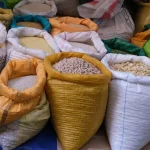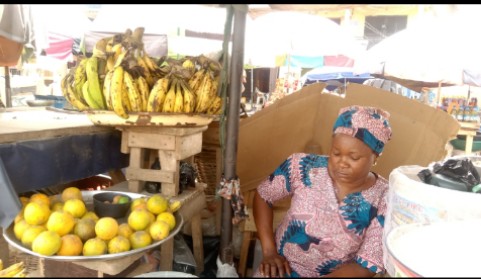Mrs. Olanrewaju, a banana seller, has not only supported her children’s education through her small trading but also managed to construct a mansion for herself.
Despite being 70 years old and selling her goods roadside in the Alekuwodo market of Osogbo, she has spent four decades in her business, which has not only provided sustenance but also paved the way for financial stability.
With a warm smile and weathered hands, Mrs. Olanrewaju recounts her journey, “I’ve been trading for 40 years now, starting with cocoa and kola nuts before settling on bananas. It’s not been easy, but I do what I must to support my family.”
Her story is not uncommon in the market stalls of Nigeria, where countless individuals toil day in and day out to make ends meet.

PC: Boluwatife Adedokun
Yet, Mrs. Olanrewaju’s determination sets her apart. “I buy bananas from different markets and sometimes supplement my stock with palm oil and kolanut. You have to be versatile in this business,” she explains.
However, amidst the trials, there are triumphs. Through her unwavering dedication, Mrs. Olanrewaju has achieved what many only dream of, “I’ve been able to provide for my family, put food on the table, and even build a home,” she says proudly.
“Most importantly, I’ve been able to send all my children to school. Education is the greatest gift I could give them.”
Challenges of Small-Scale Businesses in Nigeria
Small-scale businesses, particularly local fruit sellers, encounter a multitude of obstacles in Nigeria’s dynamic economic landscape. From inadequate infrastructure to fierce competition.
Inconsistent electricity supply poses a significant hurdle, affecting refrigeration capabilities and impacting the quality and shelf life of perishable goods. Limited access to capital further restricts opportunities for expansion and innovation, hindering the growth potential of small enterprises.
High transportation costs, exacerbated by poor infrastructure, add to the operational expenses of businesses, reducing profit margins and overall viability. Moreover, competition from larger supermarkets presents a formidable challenge, as these establishments often wield greater resources and market influence.
Unpredictable weather conditions, including fluctuations in crop yields and prices, further compound the challenges faced by local fruit sellers, making it difficult to forecast demand and plan effectively.
Additionally, issues such as theft and market fluctuations introduce additional complexities, requiring businesses to navigate a volatile marketplace with resilience and adaptability.
Despite these adversities, small and medium enterprises (SMEs) remain crucial to Nigeria’s economic development, driving innovation, employment generation, and overall growth. However, sustaining operations beyond the initial years remains a formidable task for many entrepreneurs.
According to recent research by the Central Bank of Nigeria (CBN), the majority of businesses owned by Nigerians fall into the SME category, highlighting their significant contribution to the economy. However, data from the United Nations Industrial Development Organization (UNIDO) paints a sobering picture, indicating that only a fraction of SMEs manage to sustain their operations beyond a five-year period.
Amidst these challenges, resilient entrepreneurs like Mrs. Olanrewaju and Benson Juliana exemplify determination and resourcefulness, striving to provide for their households and carve out a livelihood from their small ventures.
Navigating Challenges with Determination
Despite facing numerous challenges, Mrs. Benson has defied the odds to establish herself in the competitive world of fruit selling. Through perseverance and resilience, she has not only sustained her family but also ensured her children receive education, a milestone she cherishes as one of her greatest accomplishments.
Operating a small venture within her community, Mrs. Benson has managed to carve out a niche for herself, providing essential goods to her customers while navigating the intricacies of the market.
Reflecting on her journey, she acknowledges the difficulties encountered along the way but remains steadfast in her commitment to success.
“What I am selling now is better than what I sold before,” Mrs. Benson affirms, highlighting the evolution of her business over time.
The transition from selling provisions to food was not without its challenges, but she embraced the opportunity for growth and adaptation. Despite the changing market dynamics, Mrs. Benson’s resilience and adaptability have been key to overcoming obstacles and achieving success.
As she looks back on her journey, Mrs. Benson remains optimistic about the future, grateful for the lessons learned and the milestones achieved.
Her story serves as a testament to the unwavering spirit of Nigerian entrepreneurs, who persevere in the face of adversity to pursue their dreams and secure a better future for themselves and their families.
Small Ventures, Big Dreams
Amidst the struggles, there are triumphs to celebrate. Mrs. Benson’s proudest achievement lies in the success of her children, particularly her eldest son, who graduated from university with her husband’s assistance.
Also, Mrs. Mujidat Olarewaju embodies the spirit of perseverance amidst economic turmoil.”

The seasonal nature of fruits presents a recurring challenge, while the recent surge in prices has significantly impacted her earnings. “What once cost ₦2500 is now being sold for ₦7500, eroding my profit margins,” Mrs. Mujidat lamented.
Reflecting on the highs and lows of her trade, Mrs. Mujidat acknowledged that the best times are when sales are booming. Yet, she remains undeterred, determined to persevere through the adversities that come her way.
“Prices have skyrocketed, leaving her with little to no gain after sales. A product that once fetched ₦2500 or ₦3000 now demands a staggering ₦8000, making profitability an elusive goal,” she added.
Moreover, for Mrs. Afusat Abdulkareem, the dichotomy of achievement and adversity defines her daily reality.
“While she basks in the satisfaction of providing for her families, she remains acutely aware of the hurdles that threaten their livelihoods,” she emphasized.
Experts React
Emmanuel Kilaso, the Founder of Securecycle Initiatives, shares his expert perspective on how local businesses in Nigeria can adapt and thrive in the face of adversity.
According to Kilaso, local businesses have opportunities to innovate and evolve by exploring energy-efficient practices, optimizing supply chains, and embracing digital platforms to reach broader markets.
Highlighting the importance of adaptation, Kilaso emphasized, “Local businesses can adapt by exploring energy-efficient practices, optimizing supply chains, and leveraging digital platforms to reach wider markets.”
He addressed the fuel subsidy challenge, suggesting that businesses could “buy fuel from NNPC as they are the only ones selling at a lower price in the entire country.”
Discussing the broader economic impact, Kilaso noted, “Increased operational costs, reduced consumer spending, and supply chain disruptions pose significant hurdles for local businesses.”
Advocating for government’s support, Kilaso suggested, “Streamlined regulatory processes and initiatives promoting access to affordable credit” as crucial interventions.
Proposing concrete measures to enhance business viability, he states, “Government support can enhance their chances of profitability through purchasing the product from the farmers to avoid post-harvest losses.”
Moreso, Isioma Faustina Odita, the Program Lead of Coronada Foundation, also advocates for women entrepreneurs.
“Local business women can be supported by the government through various initiatives such as providing access to funding and grants specifically tailored to women entrepreneurs, offering training and mentorship programs, creating networking opportunities, ensuring equal access to government contracts and procurement opportunities,” Isioma emphasizes, her voice resolute with conviction.
Despite strides made, Isioma recognizes lingering disparities. “Women face challenges such as limited access to capital, gender bias in business financing, unequal access to networks and mentorship,” she laments. “Policies promoting gender equality and providing targeted support for women entrepreneurs are essential to ensure equal opportunities.”
Reflecting on governmental efforts, Isioma acknowledges progress while highlighting areas for improvement. “There is always room for enhancement,” she asserted. “To further support local business women, the government could consider strengthening access to finance, enhancing business support services, and promoting gender equality in procurement.”













